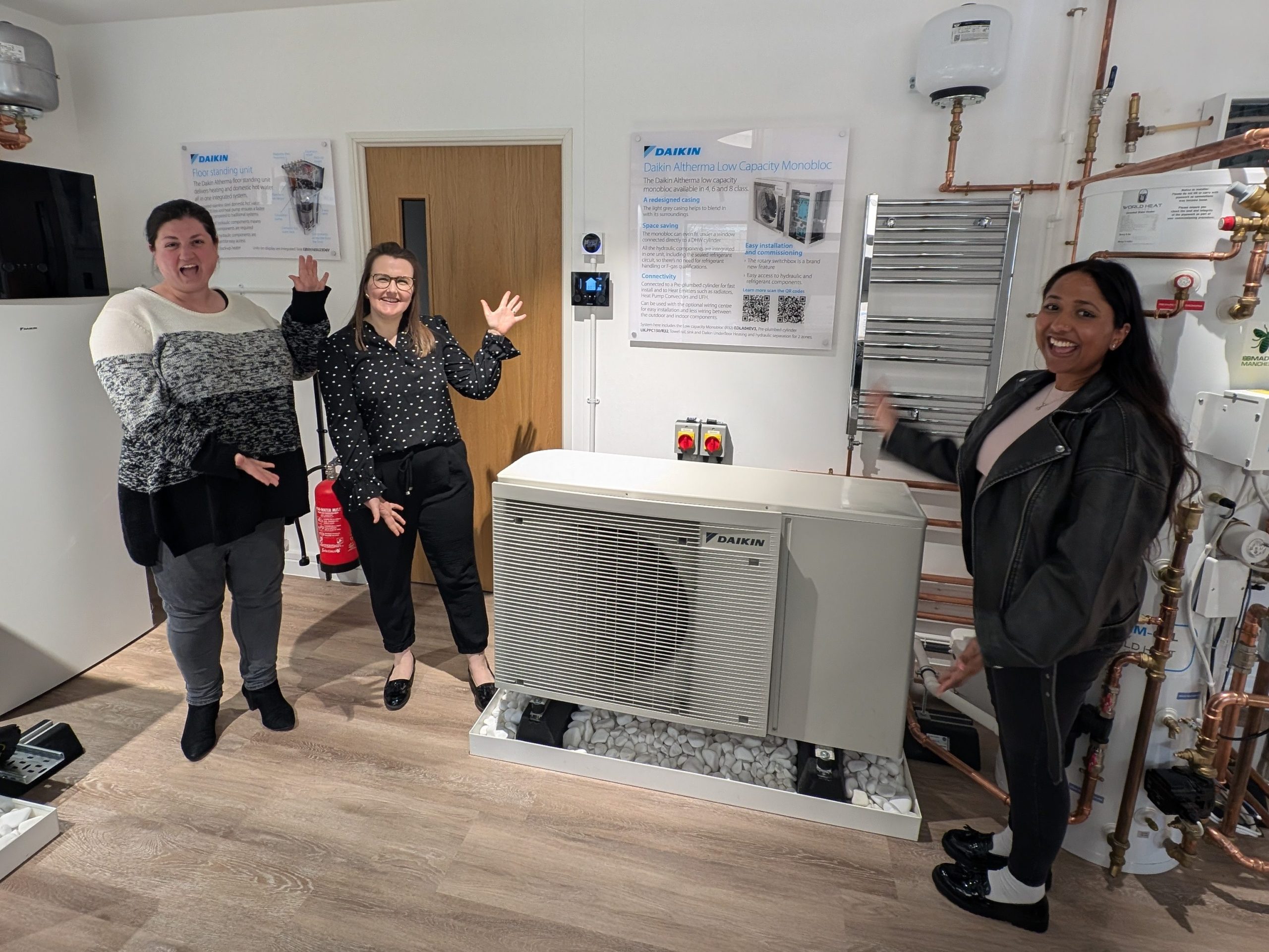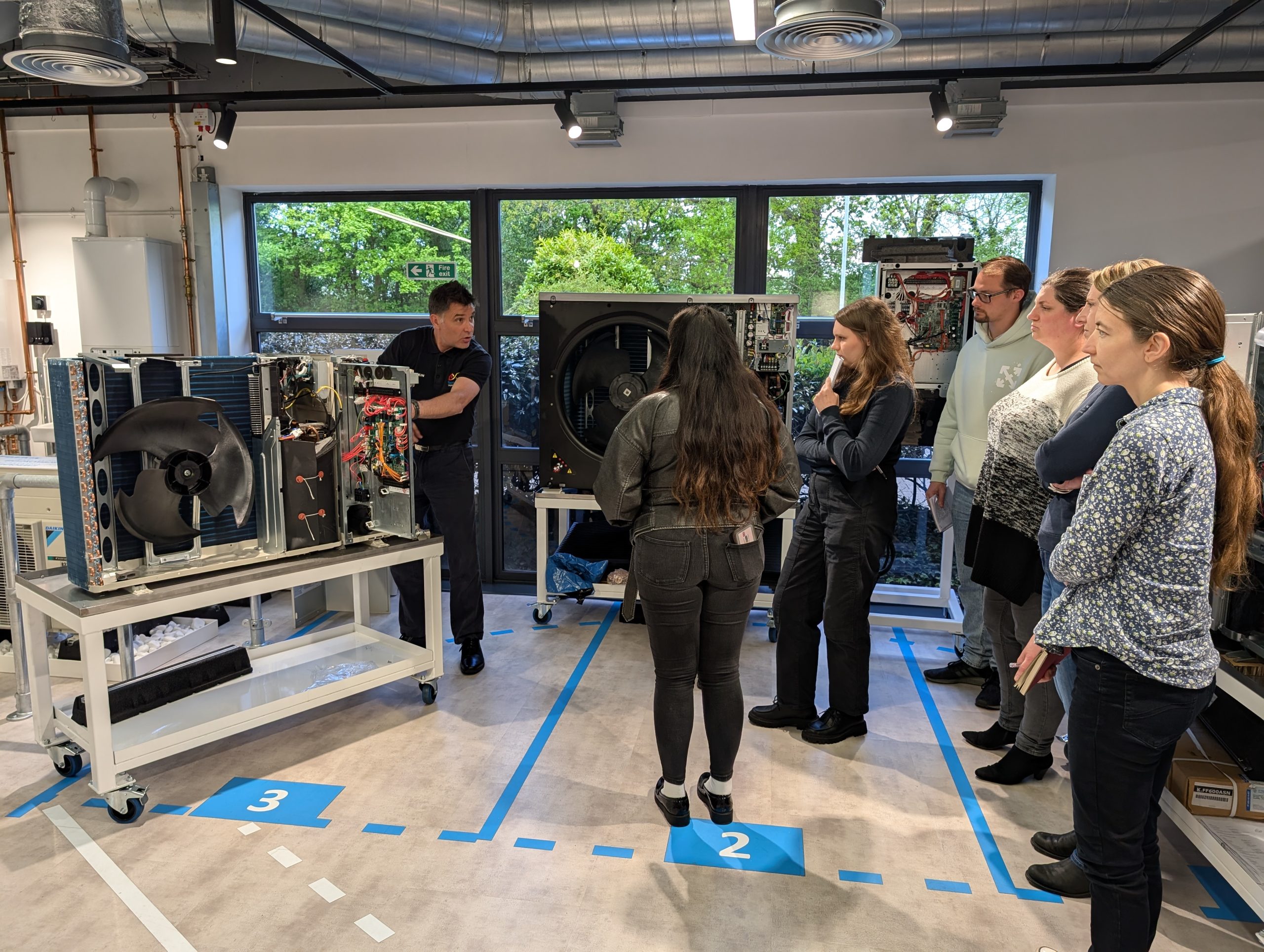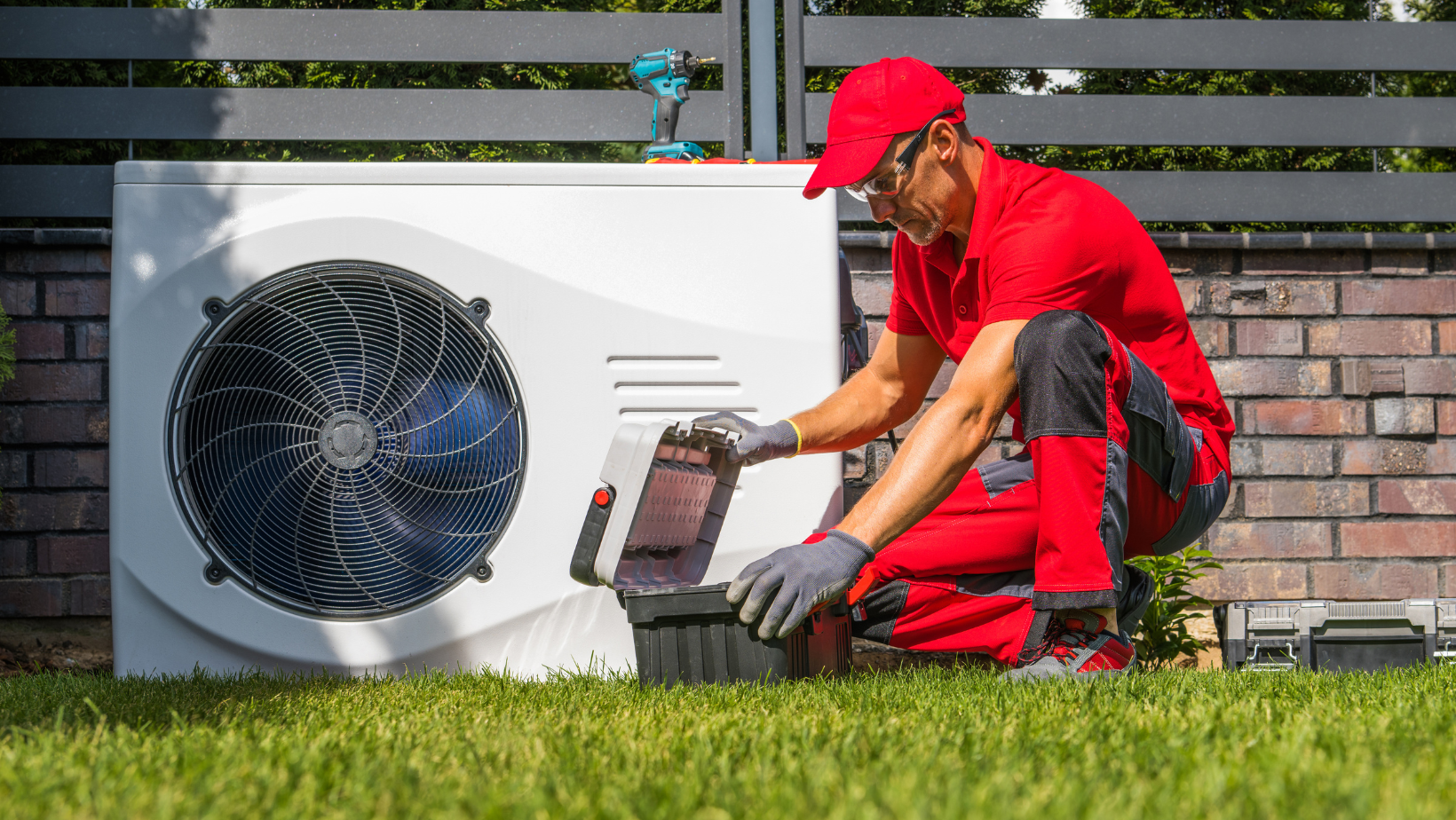What You Need to Know About Heat Pumps
Back in April, some of the Green Energy Switch team visited Daikin, a leading heat pump manufacturer, at their Birmingham office for a brilliant day of hands-on training, led by one of their expert Heating Specialists. As part of our commitment to staying at the forefront of energy innovation, and in preparation for an exciting new service we’ll be launching soon, we explored the workings of Monobloc and Hydrobloc heat pump units in depth. From understanding how air source heat pumps function to learning how they can heat and cool homes, it was an incredibly insightful session that left us feeling even more equipped to support both residents and landlords with the best sustainable solutions.



But we know what you’re probably thinking! Monobloc? Hydrobloc? What on earth are we talking about?
That’s exactly why we’ve put together this blog. We want to go back to basics to explain what a heat pump is, how it works, and why it could be the right choice for your home. We’ll break it all down in simple, easy-to-understand terms. So, let’s get into it.
What is a Heat Pump?
Put simply, a heat pump is a device that can heat AND cool your home by transferring heat from one place to another. It works by extracting heat from the air, ground, or water outside your home and using it to warm up the indoor space. In warmer months, the process is reversed, and the heat pump can act as an air conditioner, removing heat from inside and expelling it outside.
There are three types of heat pumps:
- Air Source Heat Pumps: These are the most common type and extract heat from the outside air.
- Ground Source Heat Pumps: These pumps extract heat from the ground, using buried pipes.
- Water Source Heat Pumps: These use water sources such as lakes or rivers to gather heat.
As of October 2024, over 260,000 heat pumps have been installed in homes across the UK, according to data from the Microgeneration Certification Scheme (MCS). And the momentum has continued into 2025, with 30,000 certified installations in the first six months of the year. This is a record breaking 12% increase compared to the same period in 2024. This rise in demand is largely thanks to the government funding schemes that are currently available, which we’ll dive into further down in the blog.
How Do Heat Pumps Work?
Heat pumps operate on a simple principle: moving heat from one place to another. Here’s how it works:
- Heat Collection: The heat pump extracts heat from the outside air, ground, or water using a refrigerant that absorbs the heat.
- Heat Transfer: The refrigerant is compressed, which increases its temperature. The heated refrigerant is then transferred to a heat exchanger.
- Heating Your Home: The heat is transferred into your home’s heating system (e.g., underfloor heating or radiators), warming the space.
- Cooling in Summer: In summer, the heat pump works in reverse, extracting heat from your home and releasing it outside, providing a cooling effect.
Want a more in-depth explanation? This BBC video does a great job of breaking it down.
Benefits of Heat Pumps
Heat pumps are quickly becoming a popular choice for homeowners looking for energy-efficient heating and cooling solutions. Here are the key benefits:
1. Energy Efficiency
Heat pumps are incredibly energy-efficient because they move heat using electricity, rather than generating it by burning fuel. This allows them to deliver more heat energy than they consume.
According to OVO, A-rated gas boilers are around 90% efficient, meaning you get 0.9kWh of heat for every 1kWh of gas used, so some energy is always lost in the process. In comparison, air source heat pumps (ASHPs) have an average Seasonal Coefficient of Performance of 2.8, making them 280% efficient. This means they produce nearly three times as much heat as the electricity they use, making them one of the most efficient heating options available.
2. Lower Energy Bills
Whilst the upfront cost of installing a heat pump can be high, the long-term savings on energy bills can be very significant.
Research by the Regulatory Assistance Project shows that households using an efficient heat pump can save up to 27% on heating costs compared to a gas boiler. That’s around £261 per year for an average home.
To help offset installation costs and support the move to lower-carbon heating, the Government is currently offering £7,500 grants to households in England and Wales through the Boiler Upgrade Scheme.
3. Environmentally Friendly
Heat pumps are a much greener choice than conventional heating methods like gas boilers. They produce far fewer emissions, helping to reduce your carbon footprint and make your home more sustainable.
This is one of the biggest reasons to consider installing a heat pump, and why the government is offering generous grants to encourage it. With the UK working towards its net zero target by 2050, it’s clear that more homes will need to make this switch sooner or later.
Heating our homes currently makes up around 18% of the UK’s total greenhouse gas emissions, according to the National Audit Office. So, switching to a heat pump can make a real difference. For example, if you replaced an old G-rated gas boiler with an air source heat pump in a semi-detached home, you could cut your emissions by around 2,900kg of CO₂ every year, based on figures from the Energy Saving Trust.
4. Dual Functionality
One of the most attractive features of heat pumps is their ability to heat AND cool your home, making them a versatile solution for year-round comfort.
With hotter summers and colder winters becoming more common, having a system with this dual functionality is a big plus, especially for new home buyers looking for future-proof solutions. Recent data from Ambient shows a significant rise in the use of heat pumps in new builds. From 2023 to 2025, installations increased by 14%, and in the past 12 months alone, heat pump installations in new homes have nearly doubled.
5. Long Lifespan
Heat pumps are built to last, making them a smart long-term investment for your home. Most systems last anywhere between 15 and 25 years, and typically need less maintenance than traditional heating systems.
According to Hometree, air source heat pumps can last 10 to 20 years, with newer models often lasting longer. Ground source heat pumps can last even longer, with lifespans ranging from 15 to 50 years depending on the system. In comparison, oil, electric, and gas boilers usually last 10 to 12 years, and their parts can be hard to replace once manufacturers stop making them. Evergreen Energy states that many modern heat pump units now last up to 25 years before needing any part replacements.
6. Government Incentives
In many areas, government incentives are available to help reduce the cost of installing heat pumps, making them a more affordable option for homeowners looking to upgrade their heating system.
As we already touched on, through the Boiler Upgrade Scheme, the government is currently offering grants of £7,500 towards the cost of installing a heat pump in homes across England and Wales. Government data shows applications for the scheme rose by 75% in February 2024 compared to the same month in 2023, showing how popular the support has become. To qualify, you need to own the property, be replacing a fossil fuel heating system like gas, oil, electric or LPG, and have a valid Energy Performance Certificate (EPC). If you live in Scotland, you may be eligible for similar help through the Home Energy Scotland Grant and Loan Scheme.
As of March 2025, more than 45,000 heat pumps had been installed in the UK with government support through schemes like the Boiler Upgrade Scheme and the Energy Company Obligation. This is a 41% increase compared to the previous year, and over four times more than five years ago. Most of these installations were for air source heat pumps.
Are Heat Pumps Right for Your Home?
Most homes can benefit from heat pumps, but you should consider a few key factors before making the switch. It’s also worth noting that there are lots of myths out there about heat pumps, which can put people off unnecessarily.
When considering a heat pump, it’s important to look at your home’s setup, do your research, and speak to trusted professionals. The right advice will help you decide if a heat pump is the best choice for your home.
Here are some of the key things to keep in mind:
- Good insulation helps, but it’s not a dealbreaker. Though heat pumps are more efficient in well-insulated homes, many modern systems still perform well in homes with average insulation.
- Outdoor space is needed, but not a lot is required. You will need room for an external unit, but it’s smaller than you might think, usually taking up less space than two wheelie bins.
- The upfront cost can be high, but support is available. Heat pumps may cost more to install than a gas boiler, but with grants and energy savings, the cost can balance out over time.
- They work best in moderate temperatures, but still perform in the cold. Even in freezing conditions, most modern systems – like Daikin’s – are designed to work efficiently in the UK climate, even at minus temperatures.
Conclusion
Heat pumps are a smart, future-ready choice for reducing energy use, cutting carbon, and lowering bills. With government funding available and proven performance even in colder weather, it’s easy to see why more homeowners and housing providers are making the switch.
Whether you’re upgrading or building new, heat pumps offer a reliable, low-carbon way to stay comfortable all year round.
At Green Energy Switch, we don’t install heat pumps ourselves, but we are passionate about helping people and organisations save energy, cut costs, and lower their carbon footprint. From free home energy visits and void energy management to EPCs, fully funded EV charger installations for businesses and business energy switching, we offer a range of green energy solutions to support households and housing providers alike.
Want to find out how we can help you? Get in touch with our team today.
ABOUT US
Green Energy Switch (GES) delivers a broad range of energy services across the UK. We specialise in working with social landlords and local authorities. Established in 2006, GES is a subsidiary of environmental charity PECT. We gift-aid any profits to PECT to help fund their vital work. In doing so, we are the lead sponsor of their Forest project. They have planted over 131,000 trees so far. Which equates to a remarkable reduction of over 1,300 tonnes of carbon emission.






